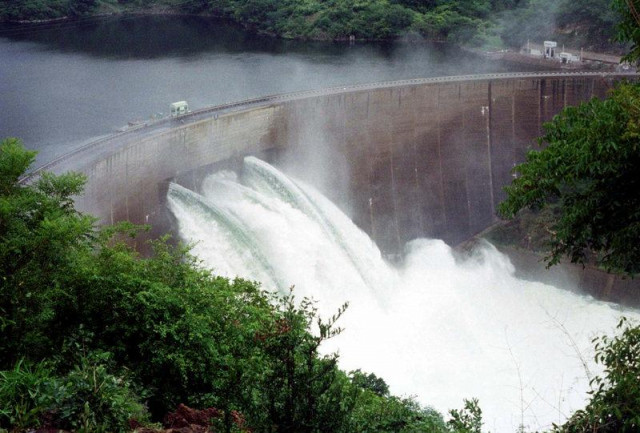Pakistan stops bid to include Diamer-Bhasha Dam in CPEC
Refuses to accept Chinese conditions including demand for project ownership

Representational image
PHOTO: REUTERS
“Chinese conditions for financing the Diamer-Bhasha Dam were not doable and against our interests,” said Hussain while briefing the Public Accounts Committee (PAC) on the status of the mega water and power project.
Tarbela Dam: Extension project nears completion
He said the Chinese conditions were about taking ownership of the project, operation and maintenance cost and securitisation of the Diamer-Bhasha project by pledging another operational dam.
These conditions were unacceptable, therefore, Prime Minister Shahid Khaqan Abbasi approved a summary to finance the dam from the country’s own resources, he said.
The issue of excluding the Diamer-Bhasha Dam from the CPEC framework also featured in the Cabinet Committee on CPEC which met last week.
The Wapda chairman and the water resources secretary informed the premier that the only way out was to fund the much-delayed project from domestic resources.
The sixth meeting of the Joint Cooperation Committee (JCC) - the highest decision-making body of CPEC - had agreed to establish a mechanism to develop hydroelectric power projects along the northern side of the Indus River including the Diamer-Bhasha project, according to minutes of the deliberations.
Pakistan decided to take the dam off the table just days before the seventh JCC meeting, which is scheduled for November 21 in Islamabad. The JCC will review progress on the implementation of already approved projects and decide the fate of new schemes.
Currently, about 15 prioritised energy projects valuing at $22.4 billion and having 11,110-megawatt generation capacity are part of the CPEC framework. Among these, only two are hydroelectric power projects with cumulative capacity of 1,590MW. Most of the CPEC energy projects are based on coal.
Pakistan has been struggling to raise money from international institutions amid Indian opposition to the project. There were hopes that Pakistan may finally complete the project after including it in the CPEC framework whose worth has already swelled to $60 billion.
Ground-breaking of the Diamer-Bhasha Dam has been performed five times in the past 15 years.
Neither the World Bank and Asian Development Bank (ADB) nor China would finance the dam, therefore, the government decided to construct the reservoir from its own resources, said Water Resources Secretary Shumail Khawaja.
The Wapda chairman blamed the ADB for the delay, saying the bank first destroyed the project and later declined to provide loan. The ADB was of the view that the project was located in a disputed territory, he said.
The project will have the capacity to generate 4,500MW of electricity in addition to the storage capacity for six million acre feet of water, which the country desperately needs due to shrinking storages.
The Wapda chairman said the project cost would hover around $14 billion and the prime minister had agreed to split the scheme into dam storage and power generation.
Federal govt will treat all parts of the country equally: PM
According to the new financing plan, he said, the federal government would provide Rs30 billion per annum over the next nine years from the Public Sector Development Programme, taking total federal contribution to Rs270 billion.
Hussain said Wapda would generate 20% of equity from its own resources whereas financing for constructing power plants would be arranged from commercial sources.
Construction work on the dam site would begin next year and the government would complete it in nine years, he said. Work on the power generation site will begin two and a half years after the start of work on the dam.
The Wapda chairman said 969MW Neelum-Jhelum and 1,410MW Tarbela extension projects would be commissioned in February next year.
Published in The Express Tribune, November 15th, 2017.
Like Business on Facebook, follow @TribuneBiz on Twitter to stay informed and join in the conversation.


















COMMENTS
Comments are moderated and generally will be posted if they are on-topic and not abusive.
For more information, please see our Comments FAQ